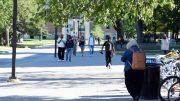Through his research, Peter Karari, a PhD student at the Arthur Mauro Centre for Peace, Justice and Conflict Studies, is hoping to raise awareness of the emotional and psychological challenges some international students face when forced to leave their families behind in order to complete their studies.
For his paper, Diasporal Home and Visa-pression: The Challenge of Reunion for International Students’ Families, Karari collected interviews and email exchanges from international students separated from their families and their experiences trying to reunite.
It also details Karari’s own experience being separated from his wife and two young daughters in Kenya. Karari came to the U of M on a student visa in September 2009, but his family was not able join him on a visitor’s visa until December 2010. Being separated from them had a profound effect on him and his family, both academically and psychologically, he said.
“It is psychologically emaciating. It is a defeatist kind of a notion that the international students will be able to concentrate on their studies when they are disunited with their families,” he said.
“I can only say that coping with the work that we have as students, with our families faraway from us, has been enabled by what I call the mysterious kindness of God.”
Karari coined the term “visa-pression” to describe the negative impacts separation has on the mental and physical health of students and their families. He said it was important to define specific terms surrounding this issue in order to properly address it.
“If we do not become specific about the problem that we are tackling, we will never be able to tackle the problem,” he said.
Karari was critical of the Canadian immigration system. He argued that if international students are expected to do well, they should be allowed to bring their families with them for the duration of their studies, considering the serious emotional impacts this separation causes.
Karari presented his research at the Strangers in New Homelands conference held at the U of M in early November. His presentation hit a cord with Doris Boateng, a PhD student from Ghana in the faculty of social work.
Boateng came to the U of M in August, leaving behind her husband and 10 month old daughter.
“I think it was the hardest thing I’ve ever had to do, leaving a 10 month old baby behind to come to study,” she said.
Leaving her family in Ghana was particularly challenging considering the high expectations placed on being a mother, she said. She worries society sees her as selfish for having left her daughter behind in order to pursue her education. This, in addition to keeping up with her studies, can be very challenging, she said.
“All these things sort of pull you in different directions. You want to develop your own self, but you have these societal expectations,” she said.
“Also being so far away from home, you don’t know what it happening. Sometimes you get a call that your baby is sick, and you feel so helpless.”
Weekly sessions with her daughter on the video-chat application, Skype, help get her though, she said.
“But on days when I don’t get to speak to her, I’m worried, I’m scared. There are so many thoughts that run through my mind.”
Boateng will complete part of her program at the U of M and will return to Ghana next May to complete the remainder of her doctorate. Though she will be able to reunite with her family in a few months, she pointed out that some students are separated from their families for years.
She went on to say that what motivated her to come to Canada were the academic opportunities, stating that in Canada they are “vast and unimaginable” compared to those in Ghana.
“[In terms of] resources, books, libraries, access to databases, I don’t have them back home, studying in Ghana. [ . . . ] Even if I want to do a literature review for my thesis, I don’t have access to a lot of resources.”
Siliva Straka, a professor in the faculty of social work and member of the faculty’s educational equity committee, argued that the challenges certain international students face when being separated from their families could be seen as an education equity issue.
She said that while educational equity polices at universities typically focus on accommodation and recruitment, she felt it was important to explore how personal issues impact students academically as well.
“Is it just about getting people in, or is it about what makes for an equitable education?” she said.
“These students who are suffering these horrendous personal situations, [ . . . ] obviously they’re education barriers. So one of the things we’re reflecting on as a committee is how do we evolve to a next stage model of equity, [ . . . ] one that would be more clearly inclusive of issues such as this.”




